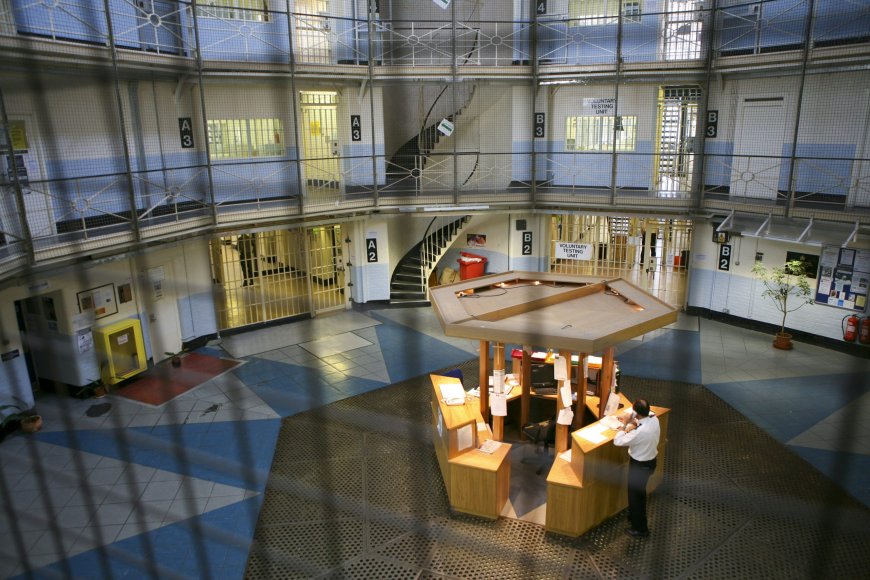The Crumbling Foundations of the UK Prison System: A Call for Radical Reform
The prison system in the United Kingdom is on the brink of collapse, beset by structural flaws that have turned correctional facilities into overcrowded warehouses of societal dysfunction. In 2024, the crisis reached alarming proportions, exposing the failures of an overburdened and under-resourced system that not only perpetuates recidivism but also imposes staggering economic and social costs on the nation.

By: A. Mahdavi
The prison system in the United Kingdom is on the brink of collapse, beset by structural flaws that have turned correctional facilities into overcrowded warehouses of societal dysfunction. In 2024, the crisis reached alarming proportions, exposing the failures of an overburdened and under-resourced system that not only perpetuates recidivism but also imposes staggering economic and social costs on the nation.
By November 2024, prisons in England and Wales were teetering on the edge of their official capacity of 88,876, housing a staggering 86,038 inmates. This overcrowding is largely a result of punitive sentencing policies and a parole system that ensnares individuals for minor infractions. Startlingly, 88% of parole violations involved no new criminal offenses but rather breaches of conditions, such as missing a meeting or drug use. Such statistics reveal a deeply flawed system more intent on punishing failure to comply with rigid parole requirements than fostering genuine reintegration into society.
The economic implications of this crisis are equally dire. The Times Crime and Justice Commission estimates that reducing prison populations to align with Western European averages could save the UK an astonishing £2.5 billion annually. Additional savings of between £330 million and £810 million per year could be realized by reintegrating prisoners into the workforce rather than keeping them incarcerated. Yet, despite these potential savings, the government has exacerbated fiscal pressures by investing £10 billion in prison infrastructure—an approach that prioritizes expansion over systemic reform.
Social consequences of this crisis compound the economic strain. High recidivism rates, driven by the so-called "revolving door" phenomenon, thwart rehabilitation efforts and perpetuate cycles of incarceration. Overcrowding and resource constraints undermine the efficacy of rehabilitation programs, leaving prisoners ill-equipped to reintegrate into society upon release. This vicious cycle entrenches societal inequities, disproportionately affecting marginalized communities and eroding public confidence in the justice system.
While the Labour government under Prime Minister Keir Starmer has acknowledged these challenges, its response has been tepid and myopic. Short-term measures, such as the early release of 3,000 prisoners and plans to construct 14,000 additional prison places by 2031, do little to address the underlying causes of the crisis. The decision to release prisoners prematurely raises valid concerns about recidivism, particularly given the systemic failures in providing adequate support for housing and employment. Furthermore, the emphasis on expanding prison capacity rather than reforming sentencing policies or investing in rehabilitation reflects a lack of strategic vision.
Critics and experts have long called for a paradigm shift in the UK’s approach to criminal justice. Former Prime Minister Lord Howard and ex-Justice Secretary David Gauke have advocated for reducing prison populations through measures such as electronic tagging and open prisons. International examples, such as reforms in Texas, where both incarceration rates and crime have decreased, underscore the feasibility and efficacy of alternative strategies. Equally pressing is the need to reassess the parole system, whose draconian conditions exacerbate overcrowding and undermine rehabilitation.
The UK prison system's multifaceted crisis demands an equally comprehensive solution. To reverse decades of failure, the government must adopt a long-term strategy that prioritizes rehabilitation, addresses overcrowding, and tackles the root causes of crime, including socioeconomic inequalities. Investments should focus on bolstering community-based alternatives to incarceration, enhancing parole support systems, and reforming sentencing practices to distinguish between violent and non-violent offenses.
Without decisive action, the consequences will be catastrophic. The current trajectory not only squanders public funds but also fuels a cycle of disenfranchisement, further corroding the social fabric. The Labour government’s inability to enact meaningful reform risks deepening public distrust and leaving an indelible stain on the UK’s commitment to justice and equality. A fairer, more effective criminal justice system is not an idealistic dream but a pressing necessity. The time for incremental change has passed; what the UK needs now is nothing less than transformative reform.













































